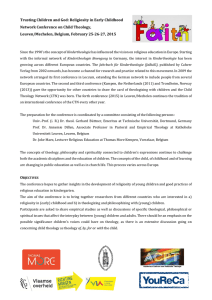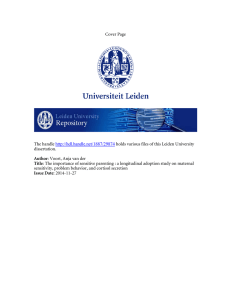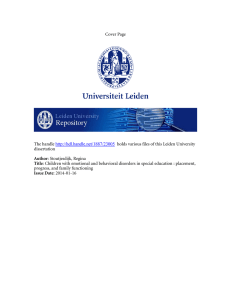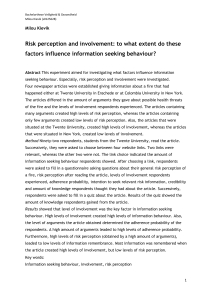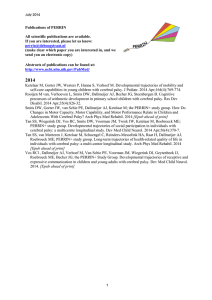Op zoek naar het onderwijsmodel van de toekomst
advertisement
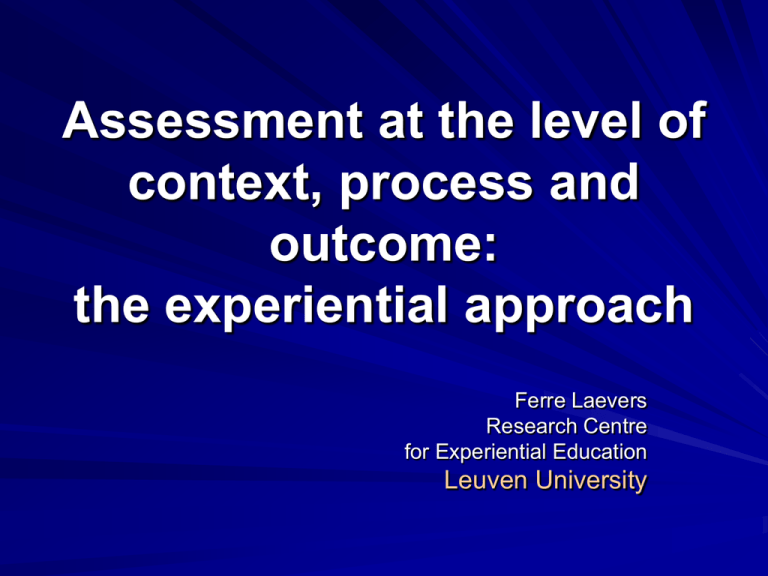
Assessment at the level of context, process and outcome: the experiential approach Ferre Laevers Research Centre for Experiential Education Leuven University A. Assessing the process Quality in care and education OUTPUT CONTEXT PROCESS objectives means outcomes principles WELL-BEING INVOLVEMENT When children... Well-being feel at ease act spontaneously are open to the world and accessible express inner rest and relaxation show vitality and self-confidence are in touch with their feelings and emotions enjoy life ...we know that their mental health is secured Involvement When children are... concentrated and focussed interested, motivated, fascinated mentally active fully experiencing sensations and meanings enjoying the satisfaction of the exploratory drive operating at the very limits of their capabilities ...we know that deep level learning is taking place The Leuven Involvement Scale 5 levels >1 >2 >3 >4 >5 No activity Interrupted activity Activity without intensity Activity with intense moments Continuous intense activity The scale for in-service training >1 Very boring – I stayed because it was impossible to leave >3 I heard it all, but nothing really caught my attention >5 I‘m impressed by fascinating thoughts that carry me away INVOLVEMENT IN 3 CHILDREN 22 19 Number of intervals 20 18 16 13 14 12 10 8 6 4 2 0 10 9 5 8 5 3 1 2 2 3 4 CHILD 1 = 2,7 0 5 0 1 2 3 4 CHILD 2 = 3,5 0 5 0 1 0 2 1 3 4 CHILD 3 = 4,3 5 Levels of involvement INVOLVEMENT IN 10 SETTINGS 3,9 4 3,7 3,5 3,5 3,4 3,4 3,5 3,6 3,4 3,3 3,1 3,1 3 2,8 1 2 3 4 5 6 Settings 7 8 9 10 PROCESS ORIENTED CHILD MONITORING SYSTEM Step 1 : Group screening for well-being and involvement Group: 23 five year olds NAMES Date: October WELL-BEING INVOLVEMENT COMMENTS Abrachim ? L M H ? L M H …………………………………… Tom ? L M H ? L M H …………………………………… Ben ? L M H ? L M H …………………………………… Olivier ? L M H ? L M H …………………………………… Daan ? L M H ? L M H …………………………………… Raf ? L M H ? L M H …………………………………… Jasper ? L M H ? L M H …………………………………… Sebastiaan ? L M H ? L M H …………………………………… Ward ? L M H ? L M H …………………………………… Ruben ? L M H ? L M H …………………………………… Joris ? L M H ? L M H …………………………………… Stefaan ? L M H ? L M H …………………………………… Frederik ? L M H ? L M H …………………………………… Jelle ? L M H ? L M H …………………………………… Kaat ? L M H ? L M H …………………………………… Ilke ? L M H ? L M H …………………………………… Els ? L M H ? L M H …………………………………… Leen ? L M H ? L M H …………………………………… Sara ? L M H ? L M H …………………………………… Marijke ? L M H ? L M H …………………………………… Eline ? L M H ? L M H …………………………………… Elize ? L M H ? L M H …………………………………… Mies ? L M H ? L M H …………………………………… PROCESS ORIENTED CHILD MONITORING SYSTEM Step 1 : Group screening for well-being and involvement SCANNINGSFORMULIER BETROKKENHEID SCHOOLCODE: KLASCODE VAK : AANTAL LLN DATUM : - - BEGIN/ EINDE INTERVAL: LEERKRACHTCODE: ..........u. ........ tot ..........u. ........ TOELICHTING CONTEXT LEERLING SCORE minimaal 1 TOELICHTING omcirkel cijfer of tussenwaarde beschrijv ing van gedrag en ev. relevante contextgegevens 1 1 2 3 4 5 2 1 2 3 4 5 3 1 2 3 4 5 4 1 2 3 4 5 5 1 2 3 4 5 6 1 2 3 4 5 7 1 2 3 4 5 8 1 2 3 4 5 9 1 2 3 4 5 10 1 2 3 4 5 11 1 2 3 4 5 12 1 2 3 4 5 FREQU. OMSCHRIJVING S CHAALWAARDEN Niveau 1 GEEN ACTIVITEIT volledig afgehaakt - dromen - prullen - tijdvullend niet-functioneel gedrag Niveau 2 VAAK ONDERBRO KEN ACTIVITEIT taakgerichte momenten + afhaken - beperkte mentale activiteit Niveau 3 +/- AANGEHO UDEN ACTIVITEIT activiteit zonder echte concentratie - oppervlakkig volgen Niveau 4 ACTIVITEIT MET INTENSE MO MENTEN momenten van concentratie & substantiële mentale activiteit Niveau 5 AANGEHO UDEN INTENSE ACTIVITEIT doorlopend sterk geconcentreerd - volkomen opgeslorpt SCANNING PROCEDURE FOR INVOLVEMENT Scanning ‘involvement’: results 1 1.5 2 2.5 3 3.5 4 4.5 5 mean 0 1 2 0 0 0 2.85 4.00 2 1 2 0 1 2 2 0 0 4 1 2 -distribution of scores in 2 classgroups- Scanning ‘involvement’: < 2.9 2.9-3.2 3.3-3.6 3.7-4.0 >4.0 School 1 School 2 School 3 School 4 School 5 School 6 Total 1 1 1 2 1 1 7 2 2 0 8 0 1 3 4 7 2 5 2 2 2 3 2 3 5 13 23 17 0 0 0 1 0 0 1 -distribution of 61 classes (primary school)- verwerking 1 - algemeen welbevinden oktober 2de jaar Welbevinden op school Welbevinden in de klas toelichting toelichting Naam Gaan score leerkrachten op 5 goed met je om? Voel je je Gaat ander goed bij de personeel andere goed met je leerlingen van om? onze school? Vind je Vind je regels en lokalen en afspraken op gebouwen school aangenaam? redelijk? Is er een score toffe sfeer op 5 in jouw klasgroep? Word jij Kan je jezelf gepest in zijn in jouw jouw klasgroep? klasgroep? Achmed 3 ja ja nee nee nee 2 nee nee ja Bjorn 4 ja ja ja nee nee 2 nee nee ja Frederik 2 nee ja nee nee nee 1 nee nee ja Glenn 4 ja ja ja ja ja 4 ja nee nee Kevin 3 ja nee nee nee nee 2 nee nee ja Kristel 1 nee nee nee nee nee 1 nee nee ja Lieven 4 ja ja nee ja nee 5 ja ja nee Mohamed 4 ja ja ja ja nee 4 ja ja nee Sirche 4 ja ja ja ja ja 4 ja nee ja Hakim 4 ja ja ja ja nee 4 ja ja nee Fatima 5 ja ja ja ja ja 4 ja nee ja Fien 3 nee ja ja nee nee 3 nee nee nee Sylvio 4 ja ja ja ja ja 3 nee nee nee Tom 4 ja ja ja nee ja 4 ja nee nee Sarah 4 ja ja nee ja nee 2 nee ja ja Stien 3 nee ja ja nee nee 4 ja nee ja Sergio 3 ja ja ja nee nee 1 nee nee ja Joris 1 nee nee nee nee nee 1 nee nee ja Pieter 4 ja ja ja nee ja 5 ja nee nee aantal ja:14 aantal ja: 16 aantal ja: 12 aantal ja: 8 aantal ja: 6 2.9 aantal ja: 9 aantal ja: 4 aantal ja: 11 totaal: 19 3.3 klas: 2d maand oktober Betrokkenheid vak Nederlands toelichting door de leerling Competentie toelichting welbevinden Naam Is het mogelijk om geconcentreerd leerkrachtscore leerlingscore te werken tijdens de lessen? Is het Houdt de altijd leerkracht duidelijk rekening wat je met je moet kunnen? doen? Krijg je Zit er voldoende voldoendel kansen afwisseling om zelf in de aan het lessen? werk te zijn? Heb je inspraak in het Is wat je leert zinvol bepalen en van de levensecht? inhoud van de lessen? Wordt er geluisterd naar leerlingen Ben je leerkrachtscore leerlingscore geïnteresseerd leerkrachtscore leerlingscore en met in dit vak? hun mening rekening gehouden? Achmed 3 4 ja ja ja nee ja ja ja ja 3 4 3 3 4 Bjorn 3 4 nee ja ja ja ja ja ja ja 5 5 4 2 4 Frederik 2 3 nee ja ja nee ja ja ja nee 2 4 3 2 3 Glenn 4 4 ja ja nee nee ja ja ja ja 4 4 3 3 2 Kevin 3 3 nee ja nee nee ja nee ja nee 4 2 2 3 2 Kristel 1 1 nee nee nee nee ja nee nee nee 3 2 2 3 3 Lieven 4 5 ja ja ja ja ja ja ja ja 5 5 5 3 5 Mohamed 2 4 nee nee ja ja ja ja ja ja 2 5 4 2 4 Sirche 4 4 nee ja ja ja ja ja ja ja 2 4 4 4 3 Hakim 5 4 nee ja ja ja ja ja ja ja 4 4 4 4 4 Fatima 4 2 nee nee nee nee ja ja ja nee 4 3 3 3 4 Fien 4 3 nee nee ja nee ja ja nee ja 4 3 2 2 3 Sylvio 4 3 nee ja ja nee ja ja nee ja 3 4 4 3 3 Tom 5 4 nee ja nee nee ja ja ja ja 4 4 4 4 4 Sarah 5 4 nee ja ja ja ja ja ja ja 4 4 4 5 4 Stien 4 3 nee ja nee ja ja nee ja nee 2 3 3 3 4 Sergio 2 3 nee ja ja ja ja nee ja nee 4 3 3 3 4 Joris 3 3 ja nee ja nee ja nee nee nee 2 4 4 3 3 Peter 4 5 nee ja ja ja ja ja ja ja 4 5 5 2 5 totaal: 19 3.5 3.5 aantal ja: 4 aantal ja: 14 aantal aantal ja: 13 ja: 9 aantal ja: 19 aantal ja: 14 aantal aantal ja: 15 ja:12 3.4 3.8 3.5 3.0 3.6 Conclusions about assessing the process Contains key information to improve quality immediate feedback about quality the shortest road to interventions A conclusive criterion for risk of stagnation tells who is taking advantage from our efforts and who doesn’t Process or productoriented? Name Involvement Competence Comments Bart 1 2 3 4 5 1 2 3 4 5 loves maths Els 1 2 3 4 5 1 2 3 4 5 gives up easily Jamal 1 2 3 4 5 1 2 3 4 5 afraid to make mistakes Hans 1 2 3 4 5 1 2 3 4 5 finds maths boring Daan 1 2 3 4 5 1 2 3 4 5 holds on to material Excerpt from the "Process-oriented Monitoring System" Subject: mathematics in first grade of primary school B. The experiential view on development Gross motor development 1 Shows excellent physical skills for his/her age, which is demonstrated in a broad range of situations where movement is required. It is a pleasure observing his/her movements in space: supple and graceful, purposeful and with efficacy, in an adjusted pace, rhythmical, readily reacting to changes and signals. Picks up new patterns of movement very easily. Deep-level-learning Holistic in nature far from a checklist of isolated skills grasps the essence Fine motor development 2 Is very skilful in handling objects and tools: is able to perform complex operations fluently and with precision. Masters a broad range of manipulations. Has an excellent co-ordination of hand and fingers, detached from the rest of the body. Easily picks up new patterns of movement. Expression through arts 3 Succeeds in expressing feelings and experiences via artistic activities and deals with these experiences by expressing them. Has an eye for aesthetic aspects in dealing with space. Takes advantage of the elements of design (symbols, colours, proportions...) to express his/her intuitions and emotions. Can express him/herself through a broad range of artistic forms of expression and can fully enjoy artistic objects (art). Language 4 Has a strong verbal capacity: succeeds in formulating experiences, perceptions and thoughts with precision and in a fluent and expressive way. Uses differentiated vocabulary and complex linguistic structures. Has a welldeveloped sense of symbols. Masters (initial) reading and writing skills. Reflects on language and linguistic properties. Understanding of the physical world 5 Is keen to explore and experience physical phenomena. Has a differentiated sense of properties and patterns of objects and living creatures. Can make sound predictions about the effects of combinations of materials and interventions. Is able to come up with adequate interventions on objects and nature and to deal with the physical world successfully. Deep-level-learning Holistic in nature far from a checklist of isolated skills grasp the essence The concept of ‘schema’ Reality Mental schemes Deep-level-learning Holistic in nature far from a checklist of isolated skills grasp the essence The concept of ‘schema’ change the program instead of adding files a dynamic process Social competence 6 Has a strong and differentiated awareness of his/her own feelings and perceptions. Shows a lot of interest in the social reality. Has a welldeveloped role-taking capacity: can enter into people’s feelings, needs and thoughts, takes them into account and acts accordingly. Masters a broad range of social behaviours and strategies and knows how to implement them successfully. Logical and mathematical thinking 7 Shows an excellent power of abstraction: consequently handles criteria to sort or classify objects, masters the necessary concepts to grasp the world of spatial relations, time and quantities. Holds spontaneous courses of reasoning by linking phenomena, describing patterns and use concepts. Self-organisation 8 Is able to manage him/herself well: knows what (s)he wants, can set goals, can engage into action without delay and achieve a good result. Does not give up at the first obstacle and can persist in order to reach his/her goal. Can step back and work strategically. Is able to exploit various possibilities and adapt to changing circumstances. Is not ruled by his/her surroundings, but actively determines the group’s course together with others. Basic qualities ➊ Respect of the child ➋ An open framework-approach ➌ A rich environment ➍ Representation ➎ Communication / interaction / inclusion ➏ Observation, observation, observation Initiative of the adult Een ‘open framework’ Programmed learning Open framework Childoriented Initiative of the child Custodial C. Assessing the output Quality in care and education OUTPUT CONTEXT PROCESS objectives means outcomes principles At the school level Develop an open framework approach A MakePARADIGM teachers competent observers SHIFT ! high level of initiative from both teachers and children/students grasp the essence of the developmental area(s) to create a rich environment see the ‘cognitive loading’ of activities enrich the environment (make the soup thicker) recognize the levels of competence At the national level Make schools accountable for ‘effort’ not for ‘outcome’ A PARADIGM SHIFT ! all developmental domains addressed in activities? level of involvement sufficient for deep level learning? Principles of a sound approach: never make public school-related information about test-results use national tests to give feedback select topics for testing that are crucial for society develop a new generation of instruments for assessment Well-being and involvement as the best test for school The quality of life in society as the final test Implications for practice A rich environment each developmental area represented An open framework approach high level of initiative from both teachers and children/students Reflective teaching observation as source of information a non-lineair rational approach A PARADIGM SHIFT ! Finding the package At the national level Make schools accountable for ‘effort’ not for ‘outcome’ Principles of a sound approach: Make accountable for ‘effort’ not for ‘outcome’ are all developmental domains represented in children’s activities? is the level of involvolvement sufficient to expect deep level learning? A PARADIGM SHIFT ! 3. Vakgegevens Betrokkenheid vakken score score leerkracht leerling toelichting bij betrokkenheid Welbevinden Heb je Krijg je Is het mogelijk Is het inspraak voldoende Houdt de Zit er om altijd Is wat je in het kansen leerkracht voldoende geconcentreerd duidelijk leert zinvol bepalen rekening afwisseling om zelf te werken wat je en van de aan het met je in de tijdens de moet levensecht? inhoud werk te kunnen lessen? lessen? doen? van de zijn? lessen? Wordt er geluisterd naar leerlingen en met hun mening rekening gehouden? Competentie score score score score score leerkracht leerling interesse leerkracht leerling Nederlands 4 ja ja nee ja ja nee ja ja 2 2 4 Frans 2 ja nee nee nee ja nee ja nee 3 3 3 Engels 3 ja ja ja ja nee nee ja ja 2 3 4 Latijn 2 nee nee ja ja nee nee nee nee 3 3 4 Grieks 4 ja ja ja ja ja ja ja nee 4 3 5 wiskunde 3 nee nee nee nee ja nee ja nee 2 1 3 fysica 4 ja ja ja ja ja nee ja nee 4 4 3 biologie 2 nee nee nee ja ja nee nee nee 3 3 4 aardrijkskunde 4 nee ja ja ja ja nee ja nee 4 4 4 geschiedenis 4 ja ja ja ja ja nee ja ja 5 4 4 godsdienst 5 ja ja ja ja ja ja ja ja 5 5 3 informatica 2 nee nee nee ja ja nee ja nee 3 2 1 muzik. opv. 2 ja nee nee nee nee nee ja nee 3 2 3 lich. opv. 2 nee ja nee ja ja nee nee nee 3 3 2 gemiddelde 3.07 3.28 3.00 3.35 difficulty of task THE ZONE OF PROXIMAL DEVELOPMENT competence of the child Basic competencies Gross motor development Fine motor development Expression through visual arts Expression through language Understanding the world of objects Understanding the world of people Logical mathematical competence Self-organisation & entrepreneurship At the school level Help teachers to grasp the essence of the developmental area(s) Help them to see the levels of competences Make accountable for ‘effort’ not for ‘outcome’ are all developmental domains represented in children’s activities? is the level of involvolvement sufficient to expect deep level learning?
